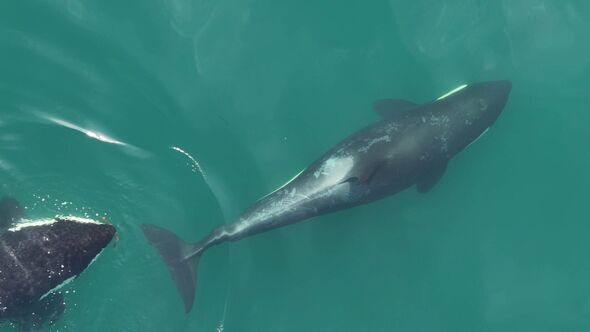Orcas have demonstrated a remarkable ability to use seaweed as grooming tools, according to a groundbreaking study. Researchers observed these intelligent marine mammals engaging in intricate back-scratching rituals using pieces of kelp, highlighting their social behaviors and potential health benefits. The study, conducted by the Centre for Whale Research (CWR) in collaboration with the University of Exeter, presents new insights into the complex lives of these creatures.
The findings were published in the journal Current Biology under the title “Wild killer whales manufacture and use allogrooming tools.” The research team captured engaging drone footage over the Salish Sea in Washington State, revealing southern resident killer whales utilizing their environment in an innovative way. Both young and adult orcas were seen participating in these grooming sessions, indicating that this behavior may strengthen social bonds and enhance dermatological health.
Innovative Grooming Rituals
Dr. Michael Weiss, the lead researcher from CWR, expressed his astonishment upon discovering the sophisticated behavior of orcas. Traditionally, whales engage in a behavior known as “kelping,” which involves playful interaction with kelp. However, this new observation introduces the concept of “allokelping,” where two whales collaborate to select and manipulate kelp. Dr. Weiss explained the physical properties of bull kelp, noting, “The stalk is firm but flexible, like a filled garden hose, with a slippery outer surface. I suspect these features make it an ideal grooming tool.”
The prevalence of allokelping was noted during eight out of twelve observation days, suggesting it is a common behavior among these whales. The researchers found that orcas often engage in this activity with close maternal relatives or peers, indicating the importance of social connections in their lives.
Technology and Continued Discovery
Rachel John, a postgraduate at the University of Exeter studying animal behavior, emphasized the significance of ongoing research in this well-studied population of orcas. “This population has been formally studied for 50 years – the best-studied orcas on the planet – and yet major new discoveries can still be made,” she stated. Improved technology has played a crucial role in this research, allowing for clearer video observations that facilitated the identification of allokelping.
Professor Darren Croft, also from the University of Exeter and executive director of CWR, reflected on the implications of this behavior for orca social dynamics. He noted, “We know touch is really important. In primates – including humans – touch moderates stress and helps to build relationships.” This observation aligns with known behaviors in killer whales, where physical contact is common among group members. The use of kelp in grooming rituals may further enhance these interactions.
The study marks a significant contribution to our understanding of orca behavior and highlights the intricate social structures within their communities. As researchers continue to explore these behaviors, the findings open new avenues for understanding the cognitive and social complexities of these remarkable marine mammals.
